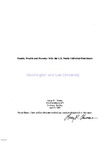Health, Wealth and Poverty: Why the U.S. Needs Universal Healthcare

View/
Author
Thomas, Lacey R.
Subject
Washington and Lee University, Shepherd Poverty Program
Poverty
Health insurance
Medicaid
Economic assistance, Domestic
Health care reform
Health
Human rights
Equality
Justice
Medical care -- Law and legislation
Metadata
Show full item recordDescription
Lacey R. Thomas is a member of the Class of 2002 of Washington and Lee University. Capstone; [FULL-TEXT FREELY AVAILABLE ONLINE] Among industrialized nations, twenty-eight of the twenty-nine cited by the World Health Organiztion have some form of universal healthcare. The exception is the United States. Poor people are the most likely to be uninsured or underinsured in America. Low-income people are more likely to suffer from health problems like cancer, infectious disease, and heart disease than higher income Americans (Handler & Hasenfeld, 133). A significant number of these poor Americans are uninsured and in spite of it, or perhaps because of it, they struggle with more health problems than the average American (Handler & Hasenfeld, 133). Certainly, health is the foremost issue when discussing uninsured persons, but the hazards faced by people without health insurance often extend beyond health risks. [From introductory section]